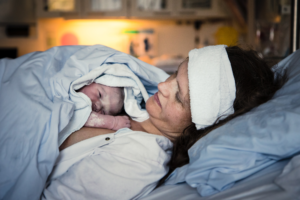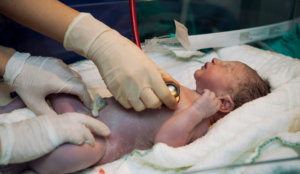- Baby Blues
- Changes in Your Body After Giving Birth
- Grandparents and the New Baby
- Infant Attachment
- Jealousy and Sibling Rivalry: Newborn Edition
- New Dad
- Newborn Routine Practices and Tests
- Preventing Baby Flat Head
- Shaken Baby Syndrome
- Taking Care Of Your Mental Health While Expecting And Caring For A Baby
- Tummy Time
Newborn Routine Practices and Tests
 The moment your baby is born is one of life’s most unforgettable moments. It is both magical and stressful at the same time.
The moment your baby is born is one of life’s most unforgettable moments. It is both magical and stressful at the same time.
What happens straight after birth will depend on your labour, how your baby is born, and how quickly your baby adapts to life outside the womb.
Most babies breathe and cry within a few seconds of being born. Once breathing well, your baby is placed naked, skin-to-skin, on your chest or belly to keep your baby warm, steady your baby’s breathing and heart rate, and form a physical bond. It’s also a trigger for an early and strong start to breastfeeding. The umbilical cord is clamped and cut. You spend quiet moments with your baby, cuddling and getting to know each other as a family.
Health assessments and procedures
The healthcare provider does a brief physical exam checking for signs that your baby is healthy.
Apgar Scoring Test
The Apgar Scoring Test is one of the first checks completed. It measures how well your baby has transitioned from life inside the womb to life outside. These five criteria receive a score of 0, 1 or 2:
 Heart rate
Heart rate- Breathing
- Muscle tone
- Response to stimuli
- Skin colour
An Apgar score of 7 to 10 is normal. A score of 4 to 6 means the baby needs help and careful monitoring. A score of 3 or below means your baby probably needs urgent medical care.
Other procedures
 Other procedures happen in the next few minutes and hours, either in the delivery room, nursery, or hospital room, depending on the hospital policy and the baby’s condition, including:
Other procedures happen in the next few minutes and hours, either in the delivery room, nursery, or hospital room, depending on the hospital policy and the baby’s condition, including:
- Clearing your baby’s airway by suctioning if they have trouble breathing.
- Putting identification bands around your baby’s wrist and ankle before leaving the delivery room. You receive a matching armband.
- Measuring their temperature, heart rate, breathing rate, weight, length, and head circumference. Small, underweight, or very large babies may need special attention and care.
- Giving eye drops or ointment prevents eye infections from the bacteria in the birth canal.
- Injecting Vitamin K. All newborns have low vitamin K levels. Vitamin K enhances the blood’s ability to clot, preventing bleeding.
- Completing a Newborn Screening Test, checking for rare but treatable conditions, is done at birth for early identification, care, and management. If treated early, it can prevent more severe health problems. The test is usually done during the first 24 hours or before hospital discharge. Your baby’s heel is pricked for this test to get a small amount of blood. Your healthcare provider will let you know if these tests require further follow-up.
- Caring for the umbilical cord starts from clamping following delivery and continues until it falls off.
- Bathing your baby when they are over 24 hours old and have a steady temperature. Delaying the first bath helps with bonding, reducing infections, stabilizing blood sugar, and improving body temperature control.
- Screening newborn hearing. A computer measures the ears’ reactions to soft sounds. The test is safe and doesn’t hurt your baby.
Services related to this information:
- Contact your Public Health Nurse.
- 811 HealthLine (Newfoundland & Labrador) – Call 811 or 1-888-709-2929 / TTY 1-888-709-3555

